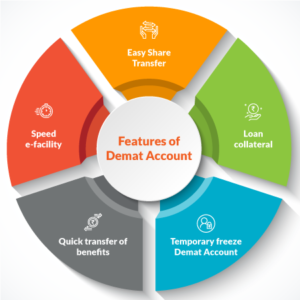
 A Demat Account (short for “dematerialized account”) is an account to hold financial securities (equity or debt) in electronic form. In India, demat accounts are maintained by two depository organizations, National Securities Depository Limited and Central Depository Services Limited. A depository participant, such as a bank, acts as an intermediary between the investor and the depository. The demat account number is quoted for all transactions to enable electronic settlements of trades to take place. Access to the dematerialized account requires an internet password and a transaction password. Transfers or purchases of securities can then be initiated. Purchases and sales of securities on the dematerialized account are automatically made once transactions are confirmed and completed.
A Demat Account (short for “dematerialized account”) is an account to hold financial securities (equity or debt) in electronic form. In India, demat accounts are maintained by two depository organizations, National Securities Depository Limited and Central Depository Services Limited. A depository participant, such as a bank, acts as an intermediary between the investor and the depository. The demat account number is quoted for all transactions to enable electronic settlements of trades to take place. Access to the dematerialized account requires an internet password and a transaction password. Transfers or purchases of securities can then be initiated. Purchases and sales of securities on the dematerialized account are automatically made once transactions are confirmed and completed.
There are many hundreds of depository participants offering the demat account facility in India as of September 2011. A comparison of the fees charged by different depository participants is detailed below. There are a few distinct advantages of having a bank as a depository participant. Having a demat account with a bank depository participant, usually provides quick processing, accessibility, convenience, and online transaction capability to the investor. Generally, banks credit the demat account with shares in case of purchase, or credit a savings account with the proceeds of a sale, on the third day. Banks are also advantageous because of the number of branches they have. Some banks give the option of opening a demat account in any branch, while others restrict themselves to a select set of branches. Some private banks also provide online access to the demat account. Hence, the investors can conveniently check online details of their holdings, transactions and status of requests through their bank’s net-banking facility. A broker who acts as a depository participant may not be able to provide these services.
Three types of demat accounts offered by depository participants

The benefits of demat account are as follows:
Benefits to the Company
The depository system helps in reducing the cost of new issues due to lower printing and distribution costs. It increases the efficiency of the registrars and transfer agents and the secretarial department of a company. It provides better facilities for communication and timely service to shareholders and investors.
Benefits to the Investor
The depository system reduces risks involved in holding physical certificates, e.g., loss, theft, mutilation, forgery, etc. It ensures transfer settlements and reduces delay in registration of shares. It ensures faster communication to investors. It helps avoid bad delivery problems due to signature differences, etc. It ensures faster payment on sale of shares. No stamp duty is paid on transfer of shares. It provides more acceptability and liquidity of securities.
Benefits to Brokers
It reduces risks of delayed settlement. It ensures greater profit due to increase in volume of trading. It eliminates chances of forgery or bad delivery. It increases overall trading and profitability. It increases confidence in their investors.

We are one of Premier financial advisors in India, providing a complete range of financial solutions.We offer Investment Advice to High Net Worth as well as Retail Investors. The products being serviced include investment in Fixed Income schemes, Mutual Fund Schemes besides term insurance, health insurance & Equity trading.